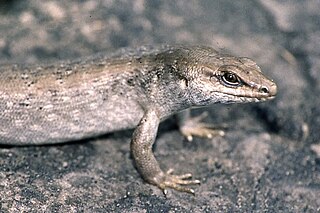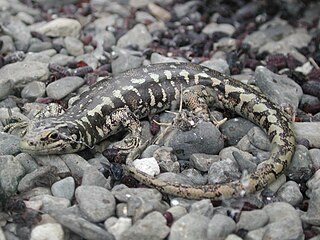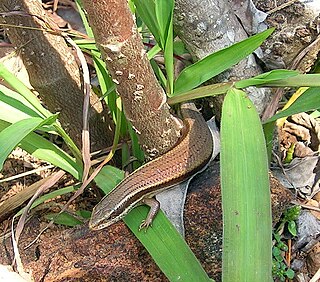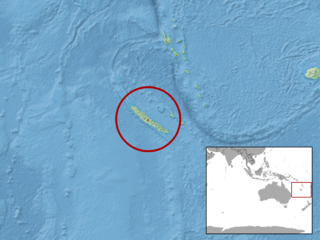
Skinks are lizards belonging to the family Scincidae, a family in the infraorder Scincomorpha. With more than 1,500 described species across 100 different taxonomic genera, the family Scincidae is one of the most diverse families of lizards. Skinks are characterized by their smaller legs in comparison to typical lizards and are found in different habitats except arctic and subarctic regions.

Acritoscincus is a genus of Australian skinks. It belongs to the Eugongylus group; the genus Oligosoma appears to be a fairly close relative. An alternative name is Bassiana.

Carlia is a genus of skinks, commonly known as four-fingered skinks or rainbow skinks, in the subfamily Eugongylinae. Before being placed in this new subfamily, Carlia was recovered in a clade with the genera Niveoscincus, Lampropholis, and others of the Eugongylus group within Lygosominae.

Eugongylus is a genus of skinks in the subfamily Eugongylinae. It was previously recognised as namesake of the Eugonglyus group of genera within Lygosominae, where it occupied a quite basal position. Members of this genus are commonly called mastiff skinks or short-legged giant skinks.

Lampropholis is a genus of skinks, commonly known as sunskinks, in the lizard subfamily Eugongylinae of the family Scincidae. The genus Lampropholis was previously found to belong to a clade with the genera Niveoscincus, Leiolopisma and others of the Eugongylus group within Lygosominae. All species of Lampropholis are endemic to Australia. For similar skinks see genera Bassiana, Pseudemoia, and Niveoscincus.

Leiolopisma is a genus of skinks. Most species occur in the region of New Caledonia-New Zealand, and they are related to other genera from that general area, such as Emoia; these and others form the Eugongylus group. One living and two extinct taxa represent a clade endemic to the Mascarenes.(Austin & Arnold 2006)

Carinascincus is a genus of skinks, commonly called snow skinks or cool-skinks and residing mainly in Tasmania or Victoria, Australia. Then recognised as the genus Niveoscincus, it was found to belong to a clade with the genera Carlia, Lampropholis and others of the Eugongylus group within Lygosominae. Cogger has rejected the use of the junior name Niveoscincus and recognizes the valid senior generic name Carinascincus for the group. For similar skinks see genera Pseudemoia, Lampropholis, and Bassiana. These skinks have adapted to the cooler weather of southern Australia and particularly Tasmania, hence the common names.

Oligosoma is a genus of small to medium-sized skinks found only in New Zealand, Norfolk Island and Lord Howe Island. Oligosoma had previously been found to belong to the Eugongylus group of genera in the subfamily Lygosominae; the Australian genus Bassiana appears to be fairly closely related.

Masticophis is a genus of colubrid snakes, commonly referred to as whip snakes or coachwhips, which are endemic to the Americas. They are characterized by having a long, thin body and are not dangerous to humans.

Lygosominae is the largest subfamily of skinks in the family Scincidae. The subfamily can be divided into a number of genus groups. If the rarely used taxonomic rank of infrafamily is employed, the genus groups would be designated as such, but such a move would require a formal description according to the ICZN standards.
Caryospora is a genus of parasitic protozoa in the phylum Apicomplexa. The species in this genus infect birds and reptiles with the majority of described species infecting snakes. It is the third largest genus in the family Eimeriidae.
Petronella Johanna Nelly de Rooij was a Dutch zoologist and herpetologist.

Geoscincus is a monotypic genus of skinks: the only accepted species is Geoscincus haraldmeieri.

The Rio Cautário Federal Extractive Reserve is an extractive reserve in the state of Rondônia, Brazil.

Eugongylinae is a subfamily of skinks within the family Scincidae. The genera in this subfamily were previously found to belong the Eugongylus group in the large subfamily Lygosominae.

Eugongylus albofasciolatus, the white-striped cape skink or barred shark skink, is a species of lizard in the family Scincidae. It is found in Australia (Queensland), the Solomon Islands, New Britain, New Ireland, and Micronesia.

The bar-lipped sheen-skink or unicolor recluse skink, is a species of lizard in the family Scincidae. It is found in Australia (Queensland), the Solomon Islands, Indonesia, and Admiralty Islands.
Eugongylus sulaensis, the Sula skink, is a species of lizard in the family Scincidae. It is found in Indonesia.

Phoboscincus garnieri, also known commonly as Garnier's giant skink and Garnier's skink, is a species of lizard in the family Scincidae. The species is endemic to New Caledonia.
Masticophis mentovarius, the neotropical whip snake, is a species of snake found in Mexico, Belize, Guatemala, Honduras, El Salvador, Nicaragua, Costa Rica, Panama, Colombia, and Venezuela.















